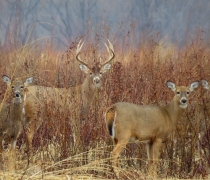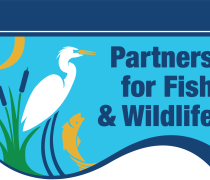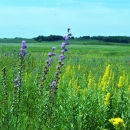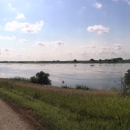
The Iowa Wetland Management District is open to a variety of public uses. Please see the Iowa Wetland Management District Public Use Brochure for complete hunting, fishing and other public use regulations for the district.

The U.S. Fish and Wildlife Service has a program called Partners for Fish and Wildlife that provides free technical and financial assistance to landowners, managers, tribes, corporations, schools and nonprofits interested in improving wildlife habitat on their land.
If you're interested in prairie, wetland, and/or oxbow restoration, please contact the Iowa Private Lands Coordinator: Drew Diallesandro, andrew_diallesandro@fws.gov, 515-994-3400
Visit Us
National wildlife refuges offer the outdoor enthusiast an opportunity to escape from the stresses of daily life and reconnect with nature. Be it the rich call of trumpeter swans, the vivid waves of windswept wildflowers or the wingbeat of mallards over decoys, a variety of outdoor experiences await visitors to waterfowl production areas within Iowa Wetland Management District.
Driving Directions
Waterfowl production areas can be found in 18 counties throughout north-central Iowa. The district office is at Union Slough National Wildlife Refuge, located about 160 miles southwest of Minneapolis, MN and northwest of Des Moines, IA in north central Iowa.
Driving from Algona, take Highway 169 north to Bancroft; turn right (east) on A-42, and proceed 6 miles to the office. From the north on Interstate 90, take the Blue Earth, MN, exit and follow Highway 169 south into Iowa. At Lakota, follow P60 south to A-42, then turn west and travel 0.25 miles to the office.
Fees
There is no charge to visit.
Restrooms
Restrooms are available inside the office at Union Slough National Wildlife Refuge during office hours.
Points of Interest
Some of the more renowned waterfowl production areas within the district include:
- Union Hills in Cerro Gordo County
- Dewey’s Pasture in Clay and Palo Alto Counties
- Dugout Creek in Dickinson County
- Kiowa Marsh in Sac County
- Dunbar Slough in Greene County
- Maynard Reece in Kossuth County
Taken in a greater context, most of these waterfowl production areas are complimented by surrounding state and county wildlife areas to form critical habitat complexes within Iowa’s intensive agricultural landscape.
Iowa Wetland Management District is managed by the Union Slough National Wildlife Refuge office. The office is open year round from 7:30 a.m. - 4:00 p.m. Monday - Friday, excluding federal holidays. The office houses interactive displays and a diorama, which shows the wildlife and habitat you may experience on the refuge and at the waterfowl production areas that make up the district. A wildlife observation platform and a 4 mile wildlife auto tour (open in late summer and for special events) have shared access points near the refuge office. We encourage visitors to stop at the office to inquire about other uses and activities.
What To Do
If you have 15 minutes
- Drive by any of the 75 waterfowl production areas
If you have one hour
- Take a walk on one of the waterfowl production areas. Make sure to capture some photographs.
- Drive the 4 mile auto tour route located near the office (subject to open dates)
- Visit the Overlook Trail and Observation Platform located near the office
If you have half a day or more
- Go hiking, birding, hunting or fishing on a waterfowl production area waterfowl production area
Waterfowl production areas are small natural wetlands and grasslands within the National Wildlife Refuge System that provide breeding, resting and nesting habitat for millions of waterfowl, shorebirds, grassland birds and other wildlife. Virtually all waterfowl production areas are in the Prairie Pothole Region states of Iowa, Minnesota, Montana, North Dakota and South Dakota.
Learn more about waterfowl production area
Know Before You Go
Northern Iowa weather can change rapidly, with windy, sub-zero winter temperatures and hot, humid summers. Tallgrass prairie and wetland habitats provide little protection from the elements, so we encourage visitors to be prepared for the season and to watch weather forecasts. A warm coat, clothing layers, hat, gloves and insulated boots are a must for winter activities. We recommend sunscreen, hat, cool breathable clothing, drinking water and insect repellent for summer visitors.
Visitor Tips
Early morning and evening are typically the best times to observe wildlife because that’s when animals are most active. Waterfowl production areas typically receive less traffic on weekdays - so wildlife are disturbed less frequently during the week. Consequently, weekdays in the morning or evening are usually the best times to visit.
Activities
Iowa Wetland Management District provides visitors with year round opportunities to hunt, fish, observe and photograph wildlife, investigate nature or take a hike just to enjoy the fresh air.
Other Facilities in the Complex
Iowa Wetland Management District is managed through the Union Slough National Wildlife Refuge office. Four tracts of Northern Tallgrass Prairie National Wildlife Refuge are managed through the Union Slough National Wildlife Refuge office as well.
Rules and Policies
Each wetland management district wetland management district
A wetland management district is a U.S. Fish and Wildlife Service office that manages waterfowl production areas in one or more counties. Waterfowl production areas are small natural wetlands and grasslands that provide breeding, resting and nesting habitat for waterfowl, shorebirds, grassland birds and other wildlife. The Fish and Wildlife Service acquires waterfowl production areas under the authority of the Migratory Bird Hunting and Conservation Stamp Act, primarily using funds from the sale of Federal Duck Stamps. The Refuge System’s 38 wetland management districts comprise thousands of waterfowl production areas – almost all in the Prairie Pothole Region of the Northern Great Plains.
Learn more about wetland management district has a set of specific regulations that pertain to it. Individuals are responsible for knowing the regulations before engaging in activities on these properties.

